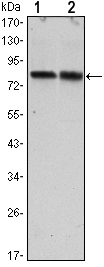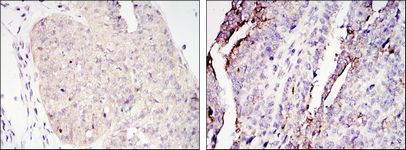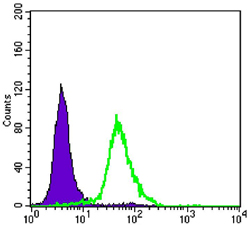TORC2 Monoclonal Antibody
- Catalog No.:YM0625
- Applications:WB;IHC;IF;FCM;ELISA
- Reactivity:Human;Monkey
- Target:
- TORC2
- Fields:
- >>PI3K-Akt signaling pathway;>>AMPK signaling pathway;>>Glucagon signaling pathway;>>Insulin resistance;>>Human T-cell leukemia virus 1 infection
- Gene Name:
- CRTC2
- Protein Name:
- CREB-regulated transcription coactivator 2
- Human Gene Id:
- 200186
- Human Swiss Prot No:
- Q53ET0
- Mouse Swiss Prot No:
- Q3U182
- Immunogen:
- Purified recombinant fragment of human TORC2 expressed in E. Coli.
- Specificity:
- TORC2 Monoclonal Antibody detects endogenous levels of TORC2 protein.
- Formulation:
- Liquid in PBS containing 50% glycerol, 0.5% BSA and 0.02% sodium azide.
- Source:
- Monoclonal, Mouse
- Dilution:
- WB 1:500 - 1:2000. IHC 1:200 - 1:1000. IF 1:200 - 1:1000. Flow cytometry: 1:200 - 1:400. ELISA: 1:10000. Not yet tested in other applications.
- Purification:
- Affinity purification
- Storage Stability:
- -15°C to -25°C/1 year(Do not lower than -25°C)
- Other Name:
- CRTC2;TORC2;CREB-regulated transcription coactivator 2;Transducer of regulated cAMP response element-binding protein 2;TORC-2;Transducer of CREB protein 2
- Molecular Weight(Da):
- 73kD
- References:
- 1. Mol Syst Biol. 2007;3:89.
2. Nature. 2007 Sep 20;449(7160):366-9.
3. J Biol Chem. 2009 Mar 20;284(12):8033-41.
- Background:
- This gene encodes a member of the transducers of regulated cAMP response element-binding protein activity family of transcription coactivators. These proteins promote the transcription of genes targeted by the cAMP response element-binding protein, and therefore play an important role in many cellular processes. Under basal conditions the encoded protein is phosphorylated by AMP-activated protein kinase or the salt-inducible kinases and is sequestered in the cytoplasm. Upon activation by elevated cAMP or calcium, the encoded protein translocates to the nucleus and increases target gene expression. Single nucleotide polymorphisms in this gene may increase the risk of type 2 diabetes. A pseudogene of this gene is located on the long arm of chromosome 5. [provided by RefSeq, Dec 2010],
- Function:
- function:Transcriptional coactivator for CREB1 which activates transcription through both consensus and variant cAMP response element (CRE) sites. Acts as a coactivator, in the SIK/TORC signaling pathway, being active when dephosphorylated and acts independently of CREB1 'Ser-133' phosphorylation. Enhances the interaction of CREB1 with TAF4. Regulates gluconeogenesis as a component of the LKB1/AMPK/TORC2 signaling pathway. Regulates the expression of specific genes such as the steroidogenic gene, StAR. Potent coactivator of PPARGC1A and inducer of mitochondrial biogenesis in muscle cells. Also coactivator for TAX activation of the human T-cell leukemia virus type 1 (HTLV-1) long terminal repeats (LTR).,polymorphism:Variant Cys-379, under a dominant model, linked to a recessive mutation in LKB1, may be asssociated with susceptibility to type II or non-insulin-dependent diabetes mellitus (
- Subcellular Location:
- Cytoplasm . Nucleus . Translocated from the nucleus to the cytoplasm on interaction of the phosphorylated form with 14-3-3 protein (PubMed:15454081). In response to cAMP levels and glucagon, relocated to the nucleus (PubMed:15454081). .
- Expression:
- Most abundantly expressed in the thymus. Present in both B and T-lymphocytes. Highly expressed in HEK293T cells and in insulinomas. High levels also in spleen, ovary, muscle and lung, with highest levels in muscle. Lower levels found in brain, colon, heart, kidney, prostate, small intestine and stomach. Weak expression in liver and pancreas.
- June 19-2018
- WESTERN IMMUNOBLOTTING PROTOCOL
- June 19-2018
- IMMUNOHISTOCHEMISTRY-PARAFFIN PROTOCOL
- June 19-2018
- IMMUNOFLUORESCENCE PROTOCOL
- September 08-2020
- FLOW-CYTOMEYRT-PROTOCOL
- May 20-2022
- Cell-Based ELISA│解您多样本WB检测之困扰
- July 13-2018
- CELL-BASED-ELISA-PROTOCOL-FOR-ACETYL-PROTEIN
- July 13-2018
- CELL-BASED-ELISA-PROTOCOL-FOR-PHOSPHO-PROTEIN
- July 13-2018
- Antibody-FAQs
- Products Images

- Western Blot analysis using TORC2 Monoclonal Antibody against HeLa (1) and HEK293 (2) cell lysate.

- Immunohistochemistry analysis of paraffin-embedded ovary tumour tissues (left) and lung cancer (right) with DAB staining using TORC2 Monoclonal Antibody.

- Immunofluorescence analysis of Hela cells using TORC2 Monoclonal Antibody (green). Blue: DRAQ5 fluorescent DNA dye. Red: Actin filaments have been labeled with Alexa Fluor-555 phalloidin.

- Flow cytometric analysis of Hela cells using TORC2 Monoclonal Antibody (green) and negative control (purple).



